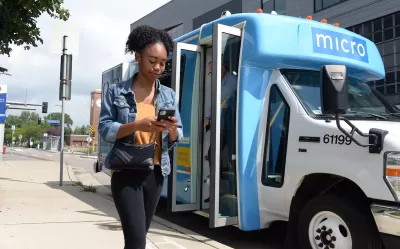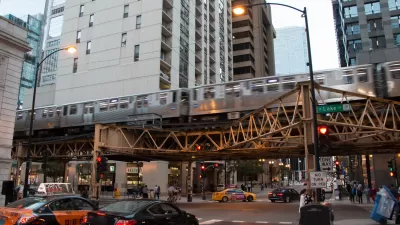In Minnesota, local transit agencies are seeing growth in ridership for on-demand microtransit services since the start of the pandemic.

The benefit of microtransit is tremendous to riders like Andrew Landon, a Minneapolis-St. Paul area resident who uses a wheelchair. Landon told Minnesota Reformer reporter H. Jiahong Pan that he prefers to use microtransit over dial-a-ride and fixed-route services because it allows him to “live more spontaneously.” Microtransit offers a middle ground between fixed-route transit services and rideshare apps like Uber and Lyft, shuttling riders to their destination on demand in low-density areas.
Landon is not alone in his preference for microtransit. While train and bus services have struggled to climb to their pre-pandemic ridership numbers, Minnesota Valley Transit Authority’s on-demand microtransit program, Connect, has seen an increase in ridership so high that it struggles to keep up with hiring drivers.
Services like Connect offer alternatives to calling a ride on an app, usually arrive as wheelchair-accessible minibuses, and cost as little as $2.50. Riders can pay with card, cash, or through the app. This flexibility allows for a more accessible service than fixed-route transit or rideshare.
Connect also offers more stable employment to drivers, who are W-2 employees and have the option to join a union. In contrast, most rideshare companies hire drivers as independent contractors. MVTA Chief Operating Officer Matt Fyten told Pan that “partnering with transportation network companies such as Lyft is something MVTA is looking into,” but they don’t intend to use Lyft as an excuse to not hire more drivers.
While agencies like MVTA are struggling to keep up with demand for microtransit, support for a one-year pilot program from the state legislature and the Minnesota Department of Transportation will give new riders a chance to try the service.
FULL STORY: Local transit agencies mimicking Uber and Lyft are seeing big ridership gains

Planetizen Federal Action Tracker
A weekly monitor of how Trump’s orders and actions are impacting planners and planning in America.

Maui's Vacation Rental Debate Turns Ugly
Verbal attacks, misinformation campaigns and fistfights plague a high-stakes debate to convert thousands of vacation rentals into long-term housing.

San Francisco Suspends Traffic Calming Amidst Record Deaths
Citing “a challenging fiscal landscape,” the city will cease the program on the heels of 42 traffic deaths, including 24 pedestrians.

Defunct Pittsburgh Power Plant to Become Residential Tower
A decommissioned steam heat plant will be redeveloped into almost 100 affordable housing units.

Trump Prompts Restructuring of Transportation Research Board in “Unprecedented Overreach”
The TRB has eliminated more than half of its committees including those focused on climate, equity, and cities.

Amtrak Rolls Out New Orleans to Alabama “Mardi Gras” Train
The new service will operate morning and evening departures between Mobile and New Orleans.
Urban Design for Planners 1: Software Tools
This six-course series explores essential urban design concepts using open source software and equips planners with the tools they need to participate fully in the urban design process.
Planning for Universal Design
Learn the tools for implementing Universal Design in planning regulations.
Heyer Gruel & Associates PA
JM Goldson LLC
Custer County Colorado
City of Camden Redevelopment Agency
City of Astoria
Transportation Research & Education Center (TREC) at Portland State University
Jefferson Parish Government
Camden Redevelopment Agency
City of Claremont





























